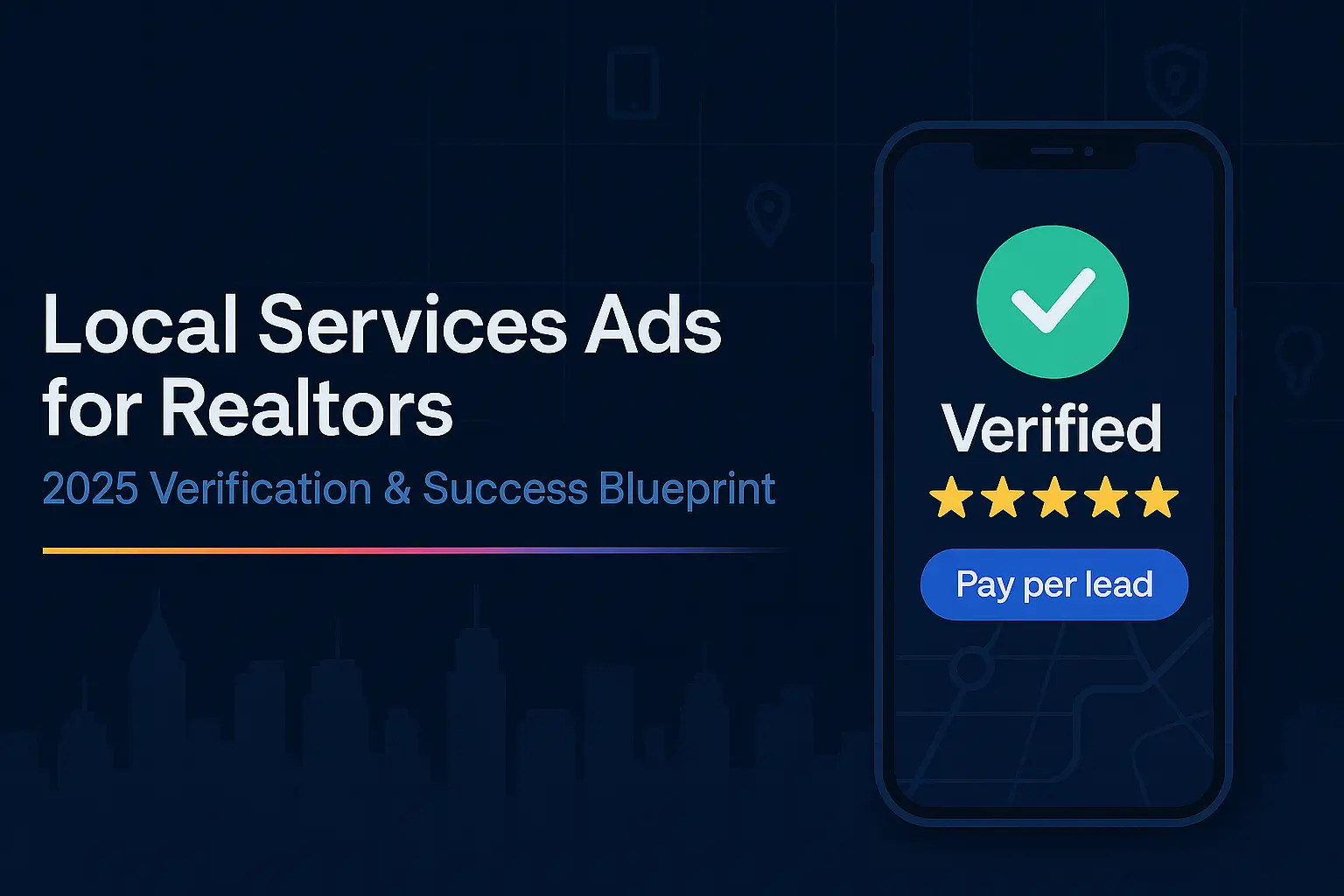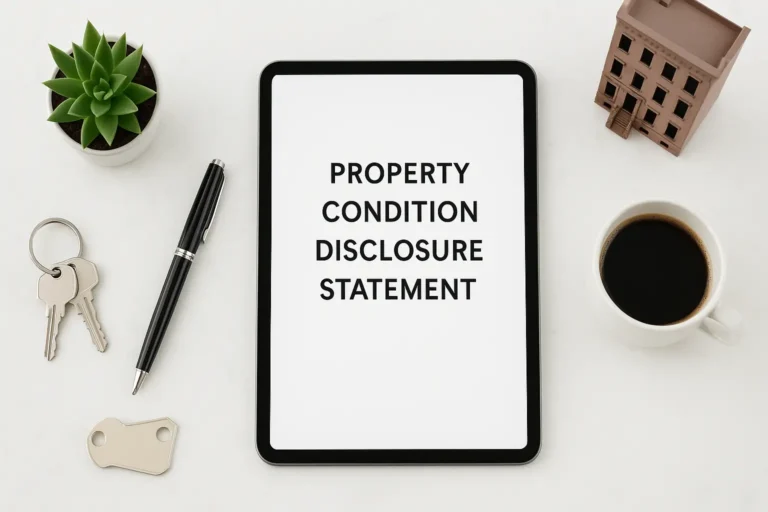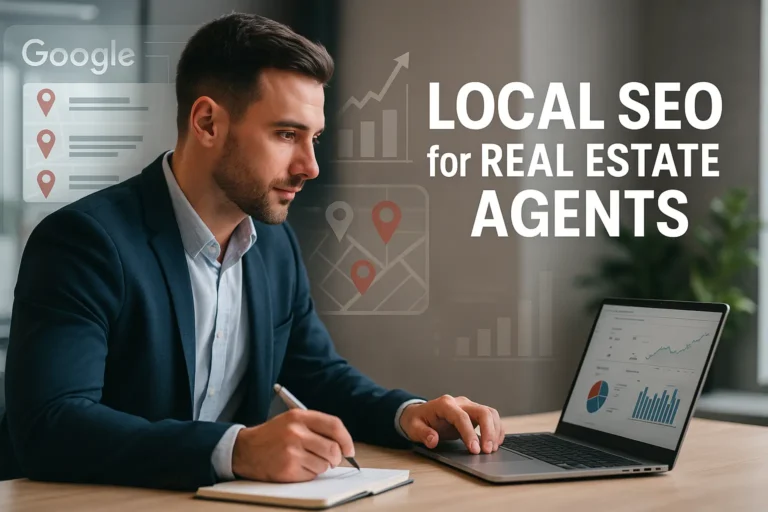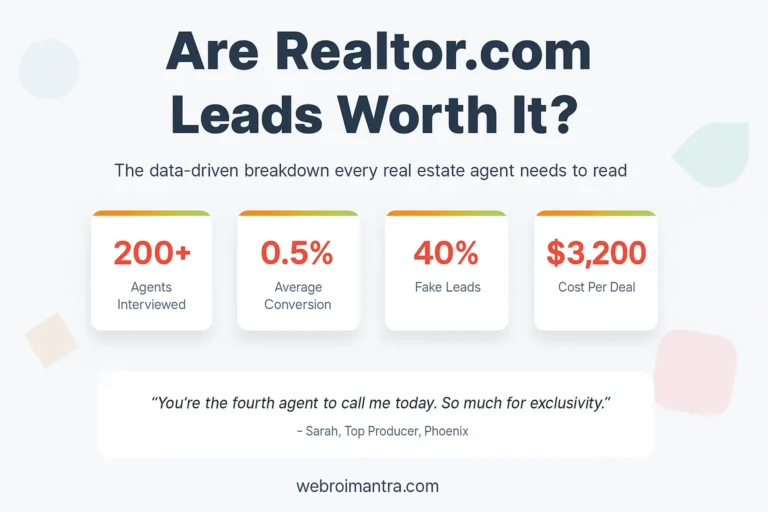The Complete Guide to Local Services Ads for Realtors: 2025 Verification & Success Blueprint
Last updated: August 23, 2025
Introduction
Picture this: A potential client searches “real estate agent near me” on Google. Your competitor appears at the very top of the results with a green “Google Verified” badge, professional headshot, and five-star reviews. Meanwhile, your traditional Google Ad sits buried below the fold. This scenario plays out millions of times daily, costing realtors valuable leads and market share.
Google remains the most used place to read local business reviews. In 2025, about 83% of consumers use Google for local reviews, according to BrightLocal. This makes local services ads for realtors verification 2025 essential for capturing high-intent buyers and sellers in your market. Unlike traditional advertising where you pay for clicks that may never convert, Google Local Services Ads (LSAs) operate on a revolutionary pay-per-lead model that transforms how realtors generate qualified prospects.
This comprehensive guide reveals the complete verification process, insider strategies for maximizing your ROI, and the upcoming platform changes that will reshape local advertising in late 2025. You’ll discover step-by-step processes to achieve Google verification, avoid common pitfalls that delay approval, and implement proven tactics that consistently generate qualified leads.
What Are Google Local Services Ads for Real Estate?
Google Local Services Ads represent a fundamental shift in local advertising, specifically designed for service-based businesses like real estate agencies. These ads appear prominently at the top of Google search results, above both traditional pay-per-click ads and organic listings, giving verified realtors premium visibility when potential clients search for local services.
The core innovation lies in their pay-per-lead structure. Instead of paying for clicks that may never convert, you only pay when qualified prospects directly contact you through phone calls or messages initiated through your ad. This model eliminates wasted spend on tire-kickers and focuses your budget exclusively on genuine leads.
Key Advantages Over Traditional Advertising
Trust-First Positioning: The Google Verified badge (formerly Google Screened) provides instant credibility. This verification signal tells potential clients that Google has thoroughly vetted your credentials, licensing, and background—addressing the primary concern in real estate transactions: trust.
Premium Search Placement: LSAs occupy the coveted top position in search results, shown prominently at the top of Google Search results (per Google). This placement typically receives 2-3 times more visibility than standard Google Ads, according to search behavior studies.
Qualified Lead Focus: The platform’s sophisticated filtering ensures you receive leads from users with genuine intent to buy or sell property. Casual browsers and information seekers rarely engage through LSAs, improving your lead quality significantly.
Local Market Dominance: LSAs are designed exclusively for local service providers, allowing you to dominate your geographic market without competing against national advertisers or lead generation companies.
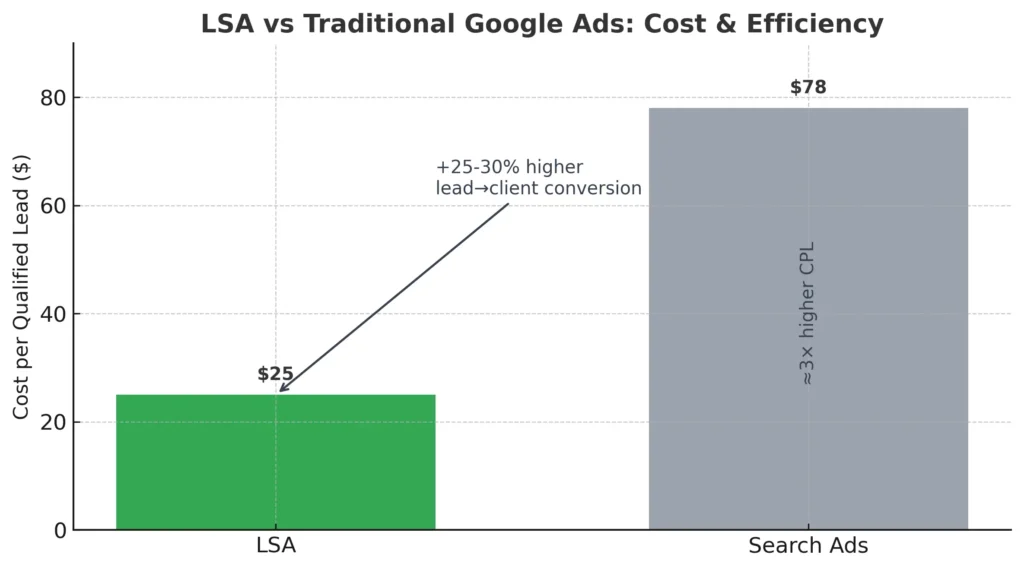
The Google Verified Badge: Your Competitive Advantage
The Google Verified badge serves as your digital seal of approval, signaling to potential clients that you’ve passed Google’s comprehensive vetting process. This verification becomes particularly valuable in real estate, where trust and credibility directly impact conversion rates.
Research from BrightLocal’s Local Consumer Review Survey shows that 87% of consumers read online reviews for local businesses, with verification badges significantly influencing their decision-making process. For realtors, this badge often determines whether a prospect chooses to contact you or scrolls to your competition.
What Google Verification Covers
Active Licensing Verification: Google confirms your real estate license remains current and in good standing with your state regulatory board. This includes checking for any recent disciplinary actions or compliance issues.
Professional Insurance Requirements: Verification includes confirming you maintain appropriate professional liability insurance and general business coverage. This protects both you and your clients during transactions.
Comprehensive Background Screening: A thorough background check covers criminal history, civil litigation records, and cross-references against national databases including sex offender and terrorist registries.
Business Legitimacy Confirmation: Google verifies your business registration, address, and operational status to ensure you represent a legitimate entity rather than a lead generation scheme.
Ongoing Reputation Monitoring: Continuous monitoring of customer reviews and ratings ensures you maintain the quality standards required for verification.
Complete Verification Requirements Checklist
Successfully obtaining Google verification requires meeting specific requirements across multiple categories. This comprehensive checklist ensures you have everything needed before starting the application process.
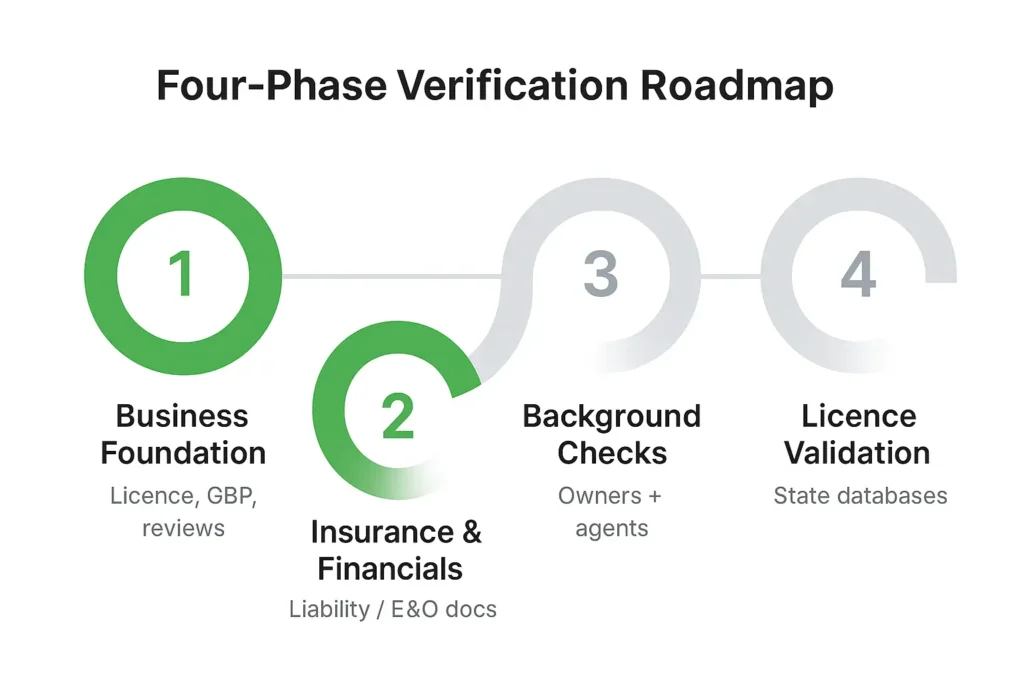
Phase 1: Business Foundation Requirements
Valid Real Estate License
- Current state license in good standing
- License number readily accessible for verification
- No recent disciplinary actions or compliance issues
- Continuing education requirements up to date
Google Business Profile Optimization
- Verified Google Business Profile with accurate information
- Complete business details including address, phone, hours, and website
- Minimum of 5 customer reviews with 4+ star average rating. Real estate agents and brokers typically need at least five Google reviews to go live, according to Google Help and Search Engine Roundtable
- Professional photos showcasing your office, team, and recent listings
- Primary category set to “Real Estate Agent” or “Real Estate Agency”
Business Documentation
- Registered business entity (LLC, Corporation, or Partnership)
- Doing Business As (DBA) documentation if applicable
- Business address verification through utility bills or lease agreements
- Federal Tax ID number (EIN) for business entities
Phase 2: Insurance and Financial Requirements
Professional Insurance Requirements
Provide valid professional liability E&O and any other insurance required in your state. Minimums and document formats vary by location and category. Ensure the insured name exactly matches your legal business name on all uploads, according to Google Help.
Insurance Documentation Standards
- Insurer company name and complete contact information
- Policy numbers and coverage amounts clearly stated
- Named insured must exactly match your business name
- Certificate holder information completed accurately
Phase 3: Background Check Process
Background checks and documents
Google screens providers through licensed third-party partners. Requirements vary by category and location and can include business, owner and professional checks, plus license verification. Submit clear scans, and make sure legal names match across all documents. Timing varies by market, with most background checks completing within 7-14 business days, according to Google Help.
Individuals Requiring Background Checks:
- Business owners and partners
- All licensed real estate agents
- Any employee providing direct client consultation or property services
- Administrative staff are typically exempt unless they handle client meetings
Required Documentation:
- Clear, high-resolution photos of front and back of government-issued ID
- Full legal name exactly as appears on identification
- Current residential address
- Date of birth
- Social Security Number (required in most states)
Background Check Coverage:
- Criminal history verification through state and federal databases
- Civil litigation history and court records
- Cross-referencing against national security databases
- Sex offender registry verification
- International sanctions and terrorist watch list checks
Phase 4: License Verification Process
State-Level Requirements:
- Real estate license validation through official state databases
- Confirmation of license status, class, and expiration dates
- Verification of continuing education compliance
- Review of any disciplinary actions or restrictions
Multi-State Operations:
- Separate verification required for each state where you provide services
- Individual licenses must be maintained for each jurisdiction
- Different states may have varying documentation requirements
Common Verification Challenges and Solutions
Understanding potential obstacles before they arise can save weeks of delays in your verification process. These solutions come from analyzing hundreds of realtor applications and identifying the most frequent roadblocks.
Challenge 1: Documentation Mismatches
The Problem: Inconsistent business names across documents represent the leading cause of verification delays. Google requires exact matches between your business license, insurance policies, bank accounts, and Google Business Profile.
The Solution: Before applying, audit all your business documents for name consistency. If you operate under multiple names or have recently changed your business structure, gather all relevant DBA filings and legal documentation. Consider updating inconsistent documents before starting the verification process rather than trying to explain discrepancies later.
Challenge 2: Background Check Complications
The Problem: Background checks fail for various reasons including outdated personal information, previous legal issues, or administrative errors in government databases.
The Solution: Be transparent about any potential issues upfront. If you have past legal matters, gather documentation showing resolution and compliance. For team-based applications, identify which team members are essential for client services versus administrative functions. Non-client-facing staff don’t require background checks, which can simplify the process.
Challenge 3: Insurance Documentation Issues
The Problem: Insurance certificates that don’t meet Google’s specific formatting requirements cause frequent delays. Common issues include incorrect business names, insufficient coverage amounts, or missing insurer contact information.
The Solution: Contact your insurance agent before applying and request certificates specifically for Google LSA verification. Provide them with your exact business name as registered and request they include all required details. Many agents are familiar with LSA requirements and can prepare compliant documentation.
Challenge 4: Review Requirements
The Problem: Insufficient customer reviews or poor review quality can prevent approval even when all other requirements are met.
The Solution: Implement a systematic review collection process at least 2-3 months before applying. Focus on obtaining reviews from recent clients who can speak to your service quality. Respond professionally to all reviews, including negative ones, to demonstrate active customer service.
Step-by-Step Setup Guide
This proven process takes most realtors 3-4 weeks to complete, assuming all documentation is prepared in advance.
Step 1: Google Business Profile Foundation
Start with your Google Business Profile since this forms the foundation for your LSA presence. Even if you already have a profile, review these optimization steps:
Profile Verification: Claim and verify your business location through Google’s postcard verification process. This can take 1-2 weeks, so start early. Proper linking and verification of your Google Business Profile is essential since eligibility and security now rely on that connection, according to Google Help.
Category Selection: Choose “Real Estate Agent” as your primary category. Add secondary categories like “Property Management” or “Commercial Real Estate” only if you actively provide these services.
Complete Information: Fill out every available field including business hours, phone numbers, website URL, and service areas. Incomplete profiles receive lower priority in the verification queue.
Visual Content: Upload high-quality photos of your office exterior and interior, team members, and recent property listings. Google recommends at least 10 photos for optimal performance.
Step 2: Documentation Preparation
Gather all required documents before starting your application to avoid delays:
Create a verification folder containing scanned copies of all documents in PDF format. Ensure all scans are clear and readable, as poor quality documents cause automatic rejections.
Document Checklist:
- Real estate license (front and back)
- Professional liability insurance certificate
- General liability insurance certificate
- Business registration documents
- Government-issued ID for all team members requiring background checks
- Proof of business address (utility bill or lease agreement)
Step 3: Google Ads Account Setup
Access Requirements: You’ll need a Google Ads account to manage LSAs. If you don’t have one, create it using the same Google account associated with your Business Profile.
Account Linking: Connect your Google Ads account to your verified Business Profile. This integration allows Google to pull your business information and reviews into your ads.
Campaign Setup: Navigate to the Local Services Ads section within Google Ads. Select “Real Estate” as your business category and begin the verification application.
Step 4: Application Submission
Information Entry: Complete all application fields with information that exactly matches your documentation. Double-check for typos or inconsistencies before submitting.
Document Upload: Upload clear, high-resolution documents in the requested formats. PDF files generally process faster than image files.
Background Check Initiation: Complete the background check application for all required team members. This process happens simultaneously with document review, not sequentially.
Step 5: Verification Timeline and Follow-up
Initial Review: Google typically acknowledges applications within 24-48 hours and begins the review process.
Background Check Processing: Pinkerton Consulting completes most background checks within 7-14 business days, though complex cases may take longer.
License Verification: State license verification usually completes within 3-5 business days for most states.
Final Approval: Once all components are approved, you’ll receive confirmation and can begin setting up your ad campaigns.
Step 6: Choose Your Bidding Mode and Weekly Budget
Start with Maximize Leads to let Google optimize bids for the most leads within your weekly budget. If you know your profitable cost per lead, test Target CPL. Use Max per Lead only when you must cap price, since it can reduce volume, according to Google Help.
Investment Analysis and ROI Expectations
Understanding the financial commitment and potential returns helps you make informed decisions about LSA implementation.
Cost Structure Breakdown
Lead Pricing: Real estate LSAs typically cost $15-$50 per qualified lead, depending on your market competition and property values. High-value markets like San Francisco or New York command premium prices, while smaller markets offer more affordable lead costs.
Budget Planning: Most successful realtors start with $200-$400 weekly budgets, generating 8-15 qualified leads per month. This budget allows for consistent presence without overwhelming your follow-up capacity.
Competitive Comparison: Traditional Google Ads in real estate average $2-$8 per click with 2-5% conversion rates to qualified leads. LSAs eliminate the uncertainty by charging only for actual lead contacts.
Return on Investment Calculations
Lead-to-Client Conversion: Industry data suggests that LSA leads convert to clients at rates 20-30% higher than traditional digital advertising leads, primarily due to the trust factor of Google verification.
Average Transaction Values: With median home prices varying by market, a single closed transaction from an LSA lead typically provides 10-50x return on the initial lead investment.
Long-term Client Value: Real estate clients often provide repeat business and referrals. The lifetime value of an LSA-generated client often exceeds $5,000-$15,000 when including future transactions and referrals.
Platform Updates: October 20, 2025 Changes
October 20, 2025: One Unified Badge
Google is replacing Google Guaranteed, Google Screened and License Verified with a single Google Verified badge, and the money-back guarantee tied to Google Guaranteed will be discontinued. Existing verified advertisers transition automatically. Ranking is not impacted by this change, according to Google Help.
Preparing for the Transition
Maintain Current Standards: Continue meeting all existing verification requirements, as these will likely transfer to the new system with minimal changes.
Review Management: Focus on maintaining high review scores and quick response times, as these factors will become more important without the money-back guarantee differentiation.
Documentation Updates: Ensure all verification documents remain current, as Google may require re-verification during the transition period.
Maximizing Your LSA Performance
Success with Local Services Ads extends beyond initial verification. These optimization strategies help you maximize lead quality and return on investment.
Response Speed Matters
Aim to respond within minutes. Google’s ranking considers factors like responsiveness, reviews and proximity. Fast replies improve visibility and lead quality. Use call forwarding, notifications and CRM integrations to shorten response times, according to Google Help.
Automated Systems: Set up call forwarding to your mobile device and enable text message notifications for new leads. Consider using customer relationship management (CRM) systems that integrate with Google’s lead reporting.
Weekend and Evening Coverage: Many property searches happen outside traditional business hours. Having coverage during these times can significantly increase your lead volume.
Geographic Targeting Strategy
Market Focus: Rather than casting a wide net, focus on 2-3 markets where you can provide exceptional service. Concentrated targeting often produces better results than broad coverage.
Zip Code Precision: Use Google’s zip code targeting to exclude areas outside your preferred service region. This prevents wasted spend on leads you can’t effectively serve.
Competition Analysis: Monitor which areas generate the highest-quality leads and adjust your geographic focus accordingly.
Profile Optimization Tactics
Regular Photo Updates: Refresh your photos quarterly with recent listings, seasonal office images, and updated team photos. Fresh content signals active business operations.
Service Description Refinement: Continuously refine your service descriptions based on the types of leads you want to attract. Mention specific neighborhoods or property types if relevant.
Review Management: Implement systematic review collection from satisfied clients and respond professionally to all feedback within 24 hours.
Integration with Your Marketing Strategy
Local Services Ads work most effectively as part of a comprehensive digital marketing approach rather than a standalone tactic.
Multi-Channel Coordination
SEO Alignment: Ensure your website content supports the same keywords and service areas you target through LSAs. This creates consistency across all Google touchpoints.
Social Media Integration: Use social platforms to showcase client testimonials and successful transactions that reinforce the trust established through your Google verification.
Email Marketing Support: Capture LSA leads in your email marketing system for long-term nurturing, especially prospects who aren’t immediately ready to buy or sell.
Lead Nurturing Systems
CRM Integration: Connect your LSA leads with your customer relationship management system for systematic follow-up and pipeline management.
Content Marketing: Provide valuable content like market reports or buying guides to LSA leads who need more time to make decisions.
Referral Programs: LSA leads often become excellent sources of referrals due to the initial trust established through Google verification.
Frequently Asked Questions
How long does the complete verification process take?
The verification process typically takes 3-4 weeks from initial application to final approval. Background checks usually complete within 7-14 business days, while license verification takes 3-5 business days. Document review adds another 5-7 business days. Complex applications with multiple team members or multi-state operations may require additional time.
What happens if my background check fails?
If a background check fails, Google provides specific details about which aspects caused the failure. You can appeal the decision if you believe there’s an error, or remove the individual who failed from your team. A second background check attempt requires a 30-day waiting period. Focus on having backup team members available in case primary individuals don’t pass verification.
Do all my team members need background checks?
Only team members who provide direct client services require background checks. This typically includes licensed agents and anyone who meets with clients or shows properties. Administrative staff, marketing coordinators, and customer service representatives usually don’t need verification unless they handle client consultations.
Can I run LSAs without a website?
Yes, LSAs function independently of your website and contain all necessary business information including contact details, reviews, and service descriptions. However, having a professional website enhances credibility and provides additional information for prospects who want to learn more about your services.
How do I dispute invalid leads?
Google provides a lead management dashboard where you can mark leads as invalid if they don’t meet qualification criteria. Google now automatically reviews leads and credits many invalid ones. Keep submitting lead feedback and notes or recordings to improve future quality and support any manual reviews, according to Google Help and Search Engine Land. Valid disputes include wrong numbers, spam calls, or inquiries outside your service area.
What counts as a qualified lead?
Qualified leads include direct phone calls lasting at least 30 seconds and messages sent through the LSA platform. Inquiries about basic business information like hours or location typically don’t qualify for charges. The lead must demonstrate genuine interest in your services and fall within your designated service area.
How does Google rank LSA listings?
Google’s ranking algorithm considers several factors: proximity to the searcher’s location, customer review scores and quantity, response time to previous leads, business hours alignment with search times, and overall account quality. Consistently quick responses and high review scores improve your ranking position.
Can I pause my ads temporarily?
Yes, you have complete control over your ad status and can pause campaigns at any time. This flexibility helps manage lead flow during busy periods or when you’re unavailable to handle new prospects. Paused ads can be reactivated instantly without losing verification status.
What if I operate in multiple states?
Multi-state operations require separate license verification for each state where you provide services. You’ll need valid real estate licenses and corresponding insurance coverage for each jurisdiction. Some states have reciprocity agreements that simplify the process, but verification is still required for each location.
How often do I need to renew my verification?
Background checks require annual renewal to maintain Google Verified status. License verification occurs based on your state’s renewal schedule, typically every 1-3 years. Insurance documentation needs annual updates when policies renew. Google sends reminder notifications before renewal deadlines.
Can I run both LSAs and traditional Google Ads simultaneously?
Yes, many successful real estate professionals run both campaign types to capture leads at different stages of the buying journey. LSAs target high-intent prospects ready to engage immediately, while traditional ads can capture earlier-stage prospects researching the market. Coordinate your campaigns to avoid keyword conflicts.
Why was my application rejected despite meeting requirements?
Common rejection reasons include mismatched business names across documents, poor quality document scans, incorrect license numbers, or temporary system issues. Review all documentation for accuracy and consistency. Ensure your Google Business Profile information exactly matches your legal documents. Contact Google support for specific rejection reasons.
Conclusion
Google Local Services Ads represent a fundamental shift in real estate lead generation, offering verified professionals unprecedented access to high-intent prospects in their local markets. The comprehensive verification process, while demanding attention to detail, creates a sustainable competitive advantage that continues delivering value long after initial setup.
Success requires more than simply passing verification. The most profitable realtors treat LSAs as part of a coordinated digital strategy, combining quick response systems, strategic geographic targeting, and ongoing profile optimization to maximize lead quality and conversion rates.
The upcoming platform changes in late 2025 will simplify the verification system while maintaining the trust signals that make LSAs effective. Now is the ideal time to complete verification and establish your presence before increased competition enters the market.
Start your LSA journey today by auditing your Google Business Profile, gathering required documentation, and initiating the verification process. The investment in time and attention to detail will generate consistent, qualified leads that fuel your real estate business growth for years to come.
Ready to dominate your local real estate market? Begin with a complete Google Business Profile audit and document your current verification status. The sooner you start, the sooner you’ll be capturing the high-quality leads your competition is missing.
Useful, trusted resources
Hand picked references from Google, HUD and ARELLO. All links open in a new tab.
Local Services Ads: Screening & verification Official Google
What Google checks and how verification works for providers.
How providers qualify for Local Services Ads Official Google
Eligibility by category and region with document notes.
How ad ranking works in Local Services Ads Official Google
Signals that influence placement like proximity reviews and responsiveness.
Bidding options: Maximize Leads, Target CPL, Max per Lead Official Google
When to use each bidding mode and how budgets affect lead volume.
About Target CPL bidding Official Google
Learning period behavior and setting a profitable target.
Automated Local Services Ads lead credits Official Google
Which invalid leads are auto credited and how feedback helps quality.
Improve your Local Services Ads performance Official Google
Best practices like response speed reviews hours and service areas.
Google Business Profile: Representation guidelines Official Google
Name address category and representation rules your GBP must follow.
All Google Business Profile policies Official Google
Complete list of GBP policies for reviews photos posts and more.
Official Local Services Ads overview Official Google
Product overview and benefits of pay per lead with the Verified badge.
Google Ads HEC policy (Housing Employment Credit) Policy
Targeting and ad restrictions for housing services. Pair with HUD guidance.
HUD: Fair Housing rights and obligations Gov
Federal Fair Housing standards to reflect in targeting and ad copy.
ARELLO: License verification across states Official
Quick links to state licensing databases for agent and broker status.
BrightLocal: Local SEO and reviews statistics Industry data
Current consumer behavior on how people use Google reviews to choose providers.
Useful, trusted resources
Hand picked references from Google, HUD and ARELLO. All links open in a new tab.
Local Services Ads: Screening & verification Official Google
What Google checks and how verification works for providers.
How providers qualify for Local Services Ads Official Google
Eligibility by category and region with document notes.
How ad ranking works in Local Services Ads Official Google
Signals that influence placement like proximity reviews and responsiveness.
Bidding options: Maximize Leads, Target CPL, Max per Lead Official Google
When to use each bidding mode and how budgets affect lead volume.
About Target CPL bidding Official Google
Learning period behavior and setting a profitable target.
Automated Local Services Ads lead credits Official Google
Which invalid leads are auto credited and how feedback helps quality.
Improve your Local Services Ads performance Official Google
Best practices like response speed reviews hours and service areas.
Google Business Profile: Representation guidelines Official Google
Name address category and representation rules your GBP must follow.
All Google Business Profile policies Official Google
Complete list of GBP policies for reviews photos posts and more.
Official Local Services Ads overview Official Google
Product overview and benefits of pay per lead with the Verified badge.
Google Ads HEC policy (Housing Employment Credit) Policy
Targeting and ad restrictions for housing services. Pair with HUD guidance.
HUD: Fair Housing rights and obligations Gov
Federal Fair Housing standards to reflect in targeting and ad copy.

